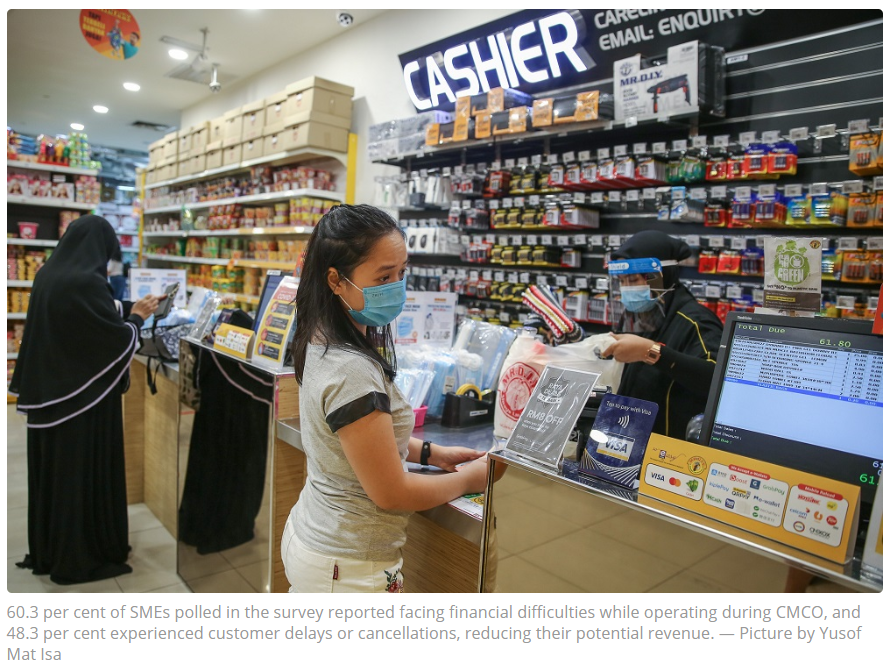Malaysia – Survey: Open or close for business, SMEs still reeling financially from effects of movement control order
KUALA LUMPUR, May 22 — Even as restrictions were eased to allow selected economic sectors to operate, a survey done among local service-based small and medium-sized enterprises (SMEs) showed how these entities, despite resuming operations, are still facing financial strains and inconsistent market demand triggered by measures taken to contain the Covid-19 outbreak.
The study conducted by local home services online platform Recommend.my also showed how these two main issues are shared problems faced by companies that resumed operations.
“The survey results show that SMEs that reopened during CMCO are facing mainly financial challenges, and government aid for SMEs has perhaps not reached those that are truly in need.
“It was also clear that customers are still being conservative about ordering services that are not urgently needed, and this has caused hesitation from service providers about coming back in full force,” read the study, titled CMCO Survey: Malaysian SMEs Struggling to Keep Head Above Water, that was published today.
A majority of respondents who said they resumed operations under the CMCO, as presented in the survey, were businesses related to home improvement and maintenance industries (62.1 per cent), followed by cleaning and disinfection services at 17.2 per cent, trailed by business services (6.9 per cent), technology and repair companies (6.9 per cent), companies in events and weddings (5.2 per cent) and lastly the wellness industry (1.7 per cent).
“The majority of SMEs reported facing financial difficulties (60.3 per cent) while operating during CMCO, and 48.3 per cent experienced customer delays or cancellations, reducing their potential revenue.
“(A total of) 41.4 per cent also reported that job sites were blocking entry. These are mainly condominiums or gated neighbourhoods.
“This meant condo and neighbourhood security guardhouses were specifically instructed by their management committees to deny access to workers, even though the government allows home services to run,” read the talking points within the survey.
Other main problems these SMEs ran into once they opened were direct concerns of contracting Covid-19 (31 per cent); bearing the costs of Covid-19 test for their workers (27.6 per cent), and dealing with demanding customers (24.1 per cent) who insist on adherence to government standard operating procedures (SOPs).
Insufficient manpower (24.1 per cent) due to a big number of local and foreign workers having returned to their hometown or home country was also noted as an issue, followed by employers’ concerns of staff health (22.4 per cent), and the inconsistent supply of raw materials (19 per cent).
The least of their worries, the survey noted, was being compliant to SOPs implemented by the government during the CMCO.
“Out of all the businesses that reopened, only 10.3 per cent said they found it hard to comply with the strict SOPs such as providing face masks and hand sanitisers to their workers and regular temperature checks.
“Even with the long list of procedures that they are required to follow, it does not appear to be their greatest worry during CMCO,” it read.
As for the 36.3 per cent of SMEs who remain closed, a majority or 48.5 per cent of them were events and wedding industry companies, 30.2 per cent being home improvement and maintenance services, followed by those in the travel and transport industry (9.1 per cent), business services (6.1 per cent), and finally those dealing with private classes and lessons (three per cent) and those in the wellness industry (three per cent).
The survey points out SMEs parked as events and wedding companies include team-building specialists, photographers, and even makeup artists, of which their inactivity was noted in the study as unsurprising considering events and social gatherings are still prohibited activities under the CMCO.
Finances were again attributed as the main issue stopping these SMEs from resuming operations, as the survey points out that volatile market sentiments with customers hesitant to start new projects, compounded by jobs getting delayed and cancelled had caused uncertainties of any potential income leading many to remain closed as an attempt at keeping costs low.
Almost half (48.5 per cent) of the companies who decided to remain closed said it was due to the financial strain brought upon by the two months of business disruptions under the MCO that began on March 18, with 42.4 per cent of saying they stayed closed due to the unclear and shifting government policies.
“It is also clear that better communication and clear policies between the government agencies; (for example) the National Security Council, Ministry of Human Resources, Ministry of Health, and those in law enforcement; e.g. the police managing roadblocks, could have and will continue to help businesses plan properly and return to operations,” the survey noted.
A total of 36.4 per cent of those who remained closed said they would wait until the CMCO was fully lifted to resume operations, as 27.3 per cent refrained from opening fearing their own health, with 21.2 per cent saying they were worried about adhering to the strict SOPs.
Other reasons listed by these companies that kept them closed was concerns facing police roadblocks despite there not being any at inter-district level (15.2 per cent), lack of manpower (15.2 per cent), the cost of Covid-19 testing required for staff (12.1 per cent), being denied entry into job sites (12.1 per cent), concerns of their employees’ health (6.1 per cent), and dealing with demanding customers (6.1 per cent).
Source: https://www.malaymail.com/news/malaysia/2020/05/22/survey-open-or-close-for-business-smes-still-reeling-financially-from-effec/1868583


 Thailand
Thailand




